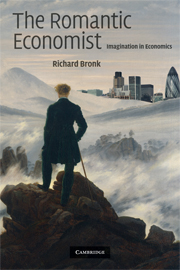Book contents
- Frontmatter
- Dedication
- Epigraph
- Contents
- Preface
- Acknowledgements
- 1 Preface to The Romantic Economist
- PART I THE PRELUDE: THE ROMANTIC ECONOMIST AND THE HISTORY OF IDEAS
- PART II Fragments of Unity: Romantic Economics in Practice
- 5 Using organic metaphors in economics
- 6 Economics and the nation state
- 7 Incommensurable values
- 8 Imagination and creativity in markets
- 9 Homo romanticus and other homines
- 10 Imagination and perspective in economics
- 11 The Romantic Economist: conclusion
- Notes
- Bibliography
- Index
6 - Economics and the nation state
Published online by Cambridge University Press: 05 March 2015
- Frontmatter
- Dedication
- Epigraph
- Contents
- Preface
- Acknowledgements
- 1 Preface to The Romantic Economist
- PART I THE PRELUDE: THE ROMANTIC ECONOMIST AND THE HISTORY OF IDEAS
- PART II Fragments of Unity: Romantic Economics in Practice
- 5 Using organic metaphors in economics
- 6 Economics and the nation state
- 7 Incommensurable values
- 8 Imagination and creativity in markets
- 9 Homo romanticus and other homines
- 10 Imagination and perspective in economics
- 11 The Romantic Economist: conclusion
- Notes
- Bibliography
- Index
Summary
NATIONAL VERSUS UNIVERSAL SOLUTIONS
Most Romantics were sceptical of any attempt to reduce human thought and social behaviour to a set of universal laws. In large part, this skepticism flowed from their focus on the organic uniqueness, complexity and creativity of each individual mind or society. They believed that neither the human mind nor society could be explained as a sort of Newtonian cosmos or machine operating in a predictable fashion according to universal principles; in each case, the organic interdependence of elements, the fact of creativity and the unique trajectories of development ensure that history matters and that there are few universal laws of any significance. This represented one of the major fault lines between Romantic social philosophy and Enlightenment thought. While Hume, for example, asserted that it is ‘universally acknowledged that there is a great uniformity among the actions of men, in all nations and ages’, and French Enlightenment figures, such as Chastellux, argued that the same rational principles could solve human problems everywhere given a basic uniformity of interests, Romantic philosophers begged to differ. Herder spearheaded a largely German reaction to the universalist thought and cosmopolitan arrogance associated in the eighteenth century chiefly with France — the dominant cultural and military power of the time. He did not, for example, believe that there is a single optimal type of government that can ‘be of use to all nations in the same fashion at one and the same time’, especially since different nations have different conceptions of the good life.
- Type
- Chapter
- Information
- The Romantic EconomistImagination in Economics, pp. 149 - 171Publisher: Cambridge University PressPrint publication year: 2009

